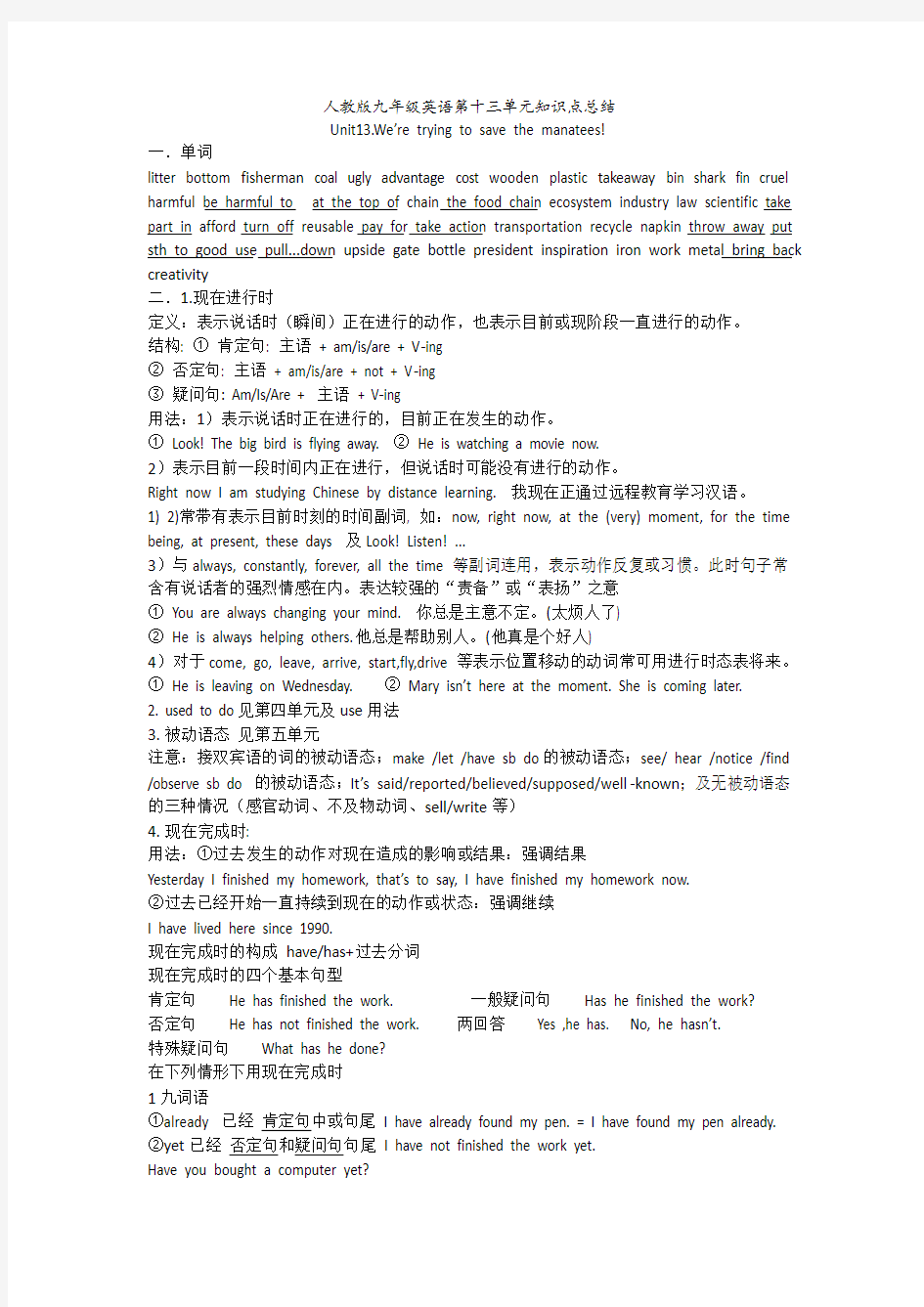
人教版九年级英语第十三单元知识点总结
- 格式:docx
- 大小:29.10 KB
- 文档页数:8


人教版九年级英语第十三单元知识点总结
Unit13.We’re trying to save the manatees!
一.单词
litter bottom fisherman coal ugly advantage cost wooden plastic takeaway bin shark fin cruel harmful be harmful to at the top of chain the food chain ecosystem industry law scientific take part in afford turn off reusable pay for take action transportation recycle napkin throw away put sth to good use pull...down upside gate bottle president inspiration iron work metal bring back creativity
二.1.现在进行时
定义:表示说话时(瞬间)正在进行的动作,也表示目前或现阶段一直进行的动作。
结构: ①肯定句: 主语+ am/is/are + V-ing
②否定句: 主语+ am/is/are + not + V-ing
③疑问句: Am/Is/Are + 主语+ V-ing
用法:1)表示说话时正在进行的,目前正在发生的动作。
①Look! The big bird is flying away. ②He is watching a movie now.
2)表示目前一段时间内正在进行,但说话时可能没有进行的动作。
Right now I am studying Chinese by distance learning. 我现在正通过远程教育学习汉语。
1) 2)常带有表示目前时刻的时间副词, 如:now, right now, at the (very) moment, for the time being, at present, these days 及Look! Listen! ...
3)与always, constantly, forever, all the time等副词连用,表示动作反复或习惯。此时句子常含有说话者的强烈情感在内。表达较强的“责备”或“表扬”之意
①You are always changing your mind. 你总是主意不定。(太烦人了)
②He is always helping others.他总是帮助别人。(他真是个好人)
4)对于come, go, leave, arrive, start,fly,drive等表示位置移动的动词常可用进行时态表将来。
①He is leaving on Wednesday. ②Mary isn’t here at the moment. She is coming later.
2. used to do见第四单元及use用法
3.被动语态见第五单元
注意:接双宾语的词的被动语态;make /let /have sb do的被动语态;see/ hear /notice /find /observe sb do 的被动语态;It’s said/reported/believed/supposed/well-known;及无被动语态的三种情况(感官动词、不及物动词、sell/write等)
4.现在完成时:
用法:①过去发生的动作对现在造成的影响或结果:强调结果
Yesterday I finished my homework, that’s to say, I have finished my homework now.
②过去已经开始一直持续到现在的动作或状态:强调继续
I have lived here since 1990.
现在完成时的构成have/has+过去分词
现在完成时的四个基本句型
肯定句He has finished the work. 一般疑问句Has he finished the work?
否定句He has not finished the work. 两回答Yes ,he has. No, he hasn’t.
特殊疑问句What has he done?
在下列情形下用现在完成时
1九词语
①already 已经肯定句中或句尾I have already found my pen. = I have found my pen already.
②yet已经否定句和疑问句句尾I have not finished the work yet.
Have you bought a computer yet?
③ever曾经句中Have you ever seen pandas?
④never从不句中I have never been to Beijing.
⑤just刚刚句中I have just done my work.
⑥before以前句尾I have never been there before.
⑦so far到目前为止So far he has learned 200 words.
⑧how long多久How long have you lived here?
⑨how many times多少次How many times has he been to Beijing?
2两词组
have
have
4如果句子里面没有时间状语,汉语意思能够加“已经”,往往用现在完成时态。
Have you lost your library book? 你已经弄丢了从图书馆借的那本书吗?
5现在完成时态还常常用于下列句型
They have planted many trees in the last/past few years.
This is the best book I have ever read.
It is the first time I have played the computer games.
在现在完成时中,一次性动词不能和一段时间状语连用
例:He has bought the book for 3 years.(错)
因buy这个一次性动词不能和一段时间for 3 years连用, 改正的办法有:
He has bought the book.. (去掉一段时间for 3 years)
He bought the book 3 years ago (改为一般过去时,使句子的意思不变)
It’s/It has been 3 years since he bought the book. = 3 years has passed since he bought the book. (改为固定句型It is/It has been ---since---)
He has had the book for 3 years. (用延续性动词have代替buy)
另外
①come/arrive/get to/reach →be here
I have come here for 3 years.(错)改为:I have been here for 3 years.
②leave/go →be away
He has left for 3 hours.(错)改为:He has been away for 3 hours.
③begin/start →be on
The film has begun for 3 minutes.(错)改为:The film has been on for 3 minutes.
④open →be open / close →be closed
The shop has opened for 3 years.(错) 改为:The shop has been open for 3 years.
⑤die →be dead
His father has died for 3 years.(错) 改为:His father has been dead for 3 years.
⑥finish/end→be over